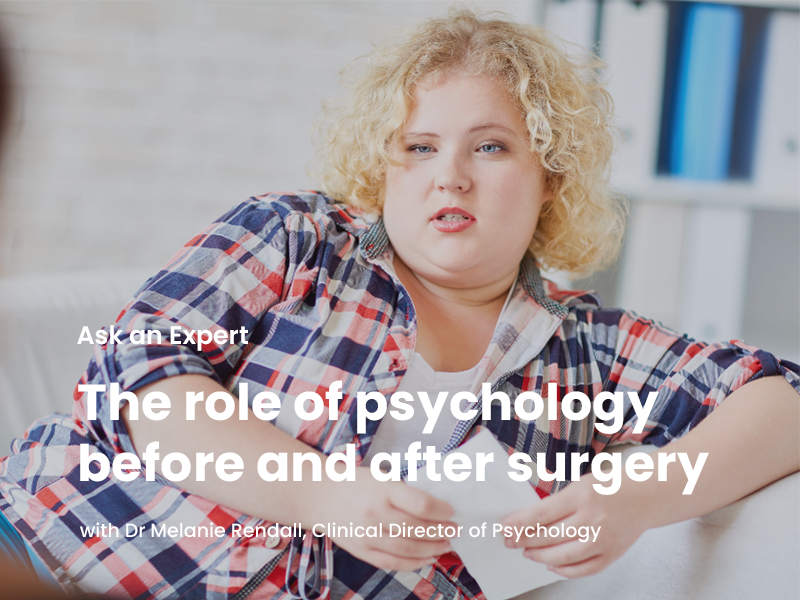Preparing for surgery involves more than just physical preparations; it also entails psychological readiness. The journey before and after surgery can be daunting, and understanding the psychological aspects can be crucial for a successful outcome. This blog post aims to shed light on the role of psychology in the context of surgery, offering insights into preparing the mind for the transformative journey ahead.
Why start psychological preparation early?
Embarking on the surgical path introduces rapid changes that can be both exhilarating and overwhelming. Many individuals reflect post-surgery, wishing they had initiated psychological preparations sooner. Regardless of the time remaining until your surgery date, dedicating moments to psychological readiness can significantly impact your post-operative experience.
Clinical Director of Psychology, Dr Melanie Rendall, outlines ‘You will likely have spent a lot of time educating yourself about surgery, the post-operative eating requirements and what other lifestyle changes are needed to work with surgery in the long term. Surgery brings about a lot of changes very rapidly, and while aspects of this can be exhilarating and liberating, some people can find the number of changes that quickly come post-surgery to be overwhelming at times. Many people tell us after surgery that they wish they had started making changes before surgery.’
Strategies for psychological preparation
Embrace preoperative eating behaviours
Familiarise yourself with the eating behaviours your dietitian will introduce. Reflect on established rules, such as finishing your plate, and consider how they align with post-surgery recommendations.
Manage cravings and urges, or ‘head hunger’
Equip yourself with skills to manage cravings and urges. Whether through self-help materials, NHS services, or specialised teams like Streamline Psychology, addressing emotional triggers can pave the way for a smoother post-operative journey.
Cultivate awareness and curiosity
Shift from autopilot to conscious awareness. Recognise habitual eating patterns and delve into the underlying thoughts and feelings influencing your eating behaviours.
Embrace physical activity
Challenge the mind’s rationalisations and incorporate physical activity into your routine. Recognise that postponing exercise based on appearance or energy levels can perpetuate inactivity post-surgery.
Understanding your relationship with food
Mindful eating
Reconnect with hunger and fullness cues, fostering mindfulness in eating habits. Recognise the psychological nuances of food choices and consumption patterns, distinguishing between physical hunger and emotional triggers.
Managing cravings and ‘head hunger’
Develop strategies to navigate cravings and ‘head hunger’. Cultivate awareness of triggers and employ techniques like urge surfing, redirecting focus, and engaging in alternative activities to manage cravings effectively.
Building compassion and self-kindness
Prioritising self-care
Acknowledge the importance of self-care, emphasising the analogy of the oxygen mask: prioritise your wellbeing to effectively support others.
Navigating self-criticism and emotions
Counteract self-criticism with compassion, challenging negative narratives and fostering a supportive inner dialogue. Embrace the spectrum of emotions, recognising their communicative nature and seeking psychological support when needed.
Cultivating realistic expectations
Adopt realistic expectations, celebrating progress and embracing setbacks as integral parts of the journey. Broaden your definition of success, acknowledging non-scale victories and the transformative changes beyond weight loss.
Avoiding social comparison
Steer clear of detrimental social comparisons, recognising the uniqueness of your journey and fostering self-compassion amidst societal pressures.
Psychological support post-procedure
Navigating post-operative challenges
Acknowledge the potential challenges post-surgery, from revisiting old eating habits to grappling with mood fluctuations. Utilise psychological support to maintain weight loss, cultivate self-compassion, and develop coping strategies tailored to your evolving needs.
The role of psychology in the surgical journey is pivotal, encompassing both preoperative preparations and post-operative adjustments. By fostering psychological awareness, cultivating adaptive strategies, and seeking support when needed, individuals can navigate the complexities of surgery with resilience and empowerment. Embrace the psychological dimension of your journey, recognising its integral role in achieving holistic wellbeing before and after surgery.



